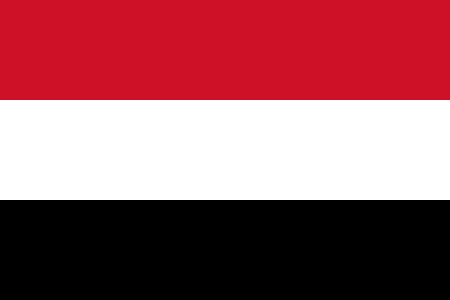News
Outside Yemen’s rebel held capital, stalemated war rages on

Flag of Yemen (Photo By Wikimedia Commons – Open Clip Art website, CC0)
ON THE OUTSKIRTS OF SANAA, Yemen — In the rocky highlands outside of Yemen’s rebel-held capital, it quickly becomes clear how the Arab world’s poorest country remains mired in a stalemated civil war.
Soldiers and militiamen loyal to Yemen’s internationally recognized government describe having a tantalizing view on a clear day of Sanaa’s international airport from the moonscape mountains. The price is a steady barrage of incoming fire on the exposed hillside from Shiite rebels, known as Houthis, that makes any further advance treacherous, even with the aid of Saudi-led airstrikes.
The nearly three-year civil war, pitting the Saudi-led coalition against the rebels, has killed more than 10,000 people, displaced 2 million and helped spawn a devastating cholera epidemic — and yet the front lines have hardly moved.
“In mountainous areas like this it’s difficult. The American Army struggled with that in Afghanistan,” Yemeni Maj. Gen. Nasser Ali al-Daibany told Associated Press reporters who were granted access to the front lines on a tour organized by the Saudi-led coalition. “But for us this won’t slow us down … because our boys, our fighters, were trained in these mountains, so they are the sons of this area.”
The comparison to Afghanistan, where the U.S. war is now 16 years old, feels apt.
Yemen has also seen decades of conflict, first with the 1960s civil war that ended North Yemen’s monarchy. Fighting between Marxist South Yemen and the north followed. Yemen unified in 1990, but resentment persisted under 22 years of kleptocratic rule by Ali Abdullah Saleh.
Yemen’s 2011 Arab Spring protests ultimately forced Saleh to resign, but he continued to wield power behind the scenes and maintained the loyalty of many armed forces commanders. In 2014 he formed an alliance with the Houthis — who he had gone to war with in the past — and helped them capture the capital, Sanaa.
Saudi Arabia entered the conflict the following year, at the head of an Arab coalition heavily supported by the United Arab Emirates. They have sought to restore the internationally recognized government, led by President Abed Rabbo Mansour Hadi, who is based in Saudi Arabia and whose rule is largely confined to the southern port city of Aden.
Riyadh views the Houthis as an Iranian proxy, and both Saudi Arabia and the United States say Tehran has provided the long-range missiles the rebels have fired into the kingdom. While Tehran supports the Houthis, it denies arming them.
The Saudi-led coalition has waged a devastating air campaign, repeatedly striking markets, medical facilities and civilian targets. The U.N. has attributed over half of reported child civilian casualties in the conflict to the coalition, and calls Yemen the worst humanitarian crisis in the world.
As the war has dragged on, it has become more muddled, with internal conflicts erupting on both sides. Saleh broke with the Houthis last year and appeared to switch sides, only to be gunned down by the rebels. In recent days, southern separatists backed by the UAE have clashed with forces loyal to Hadi in Aden. Al-Qaida in the Arabian Peninsula, long seen as one of the most sophisticated offshoots of the global terror network, has exploited the chaos to regroup.
“Yemen has become in many senses a ‘chaos state,’ a place where the central government has either collapsed or lost control of large segments of the territory,” Chatham House expert Peter Salisbury recently wrote. “Yet ‘chaos’ is a relative term. Although Yemen indeed appears to be chaotic from the outside .
it contains its own internal logic, economies and political” powers.
All that can be seen in Marib, a province bordering Saudi Arabia and the northeastern highlands held by the Houthis. Nearly every man and some boys have Kalashnikov assault rifles slung over their shoulders, making it difficult to tell civilians from combatants at first glance.
Many drivers don’t bother with license plates.
Saudi Arabia backs Marib’s local governor, Sultan al-Aradah. He holds power with tribal militias and fighters from Islah, Yemen’s main Sunni Islamist political party with ties to the Muslim Brotherhood, of which the UAE remains wary. Irregular forces man checkpoints across the province, and gunfire echoes day and night in the provincial capital.
AP reporters were taken to a peak 48 kilometres (30 miles) from Sanaa International Airport, just inside Sanaa province. The front lines haven’t changed dramatically in recent months, though the Saudi-backed forces have clawed back some hillsides.
Here in the mountains, militiamen and soldiers point to crevices and man-made caves used by rebels fighters before they were driven back two months ago. They say they retook the area, called “Sniper’s Mountain,” after heavy losses from gunfire and land mines. Spent mortar rounds and bullet casings litter the ground. The corpse of a Houthi fighter rotted nearby.
Apache attack helicopters could help, the soldiers said. Al-Daibany, the general, said authorities have a plan to slowly squeeze Sanaa while trying to allow civilians free passage from the capital.
But for now, the war continues, one whistling shell at a time. Col. Yahya al-Hatimi, who has lost three brothers to the fighting, gestured to his village, across the front lines and visible from the mountain top. His family still lives in the area, something that caused him to pause for a moment, overcome by emotion.
“I miss my life. I’m missing my life and my family,” he said. “But we are promising here that I am arriving” soon.





















